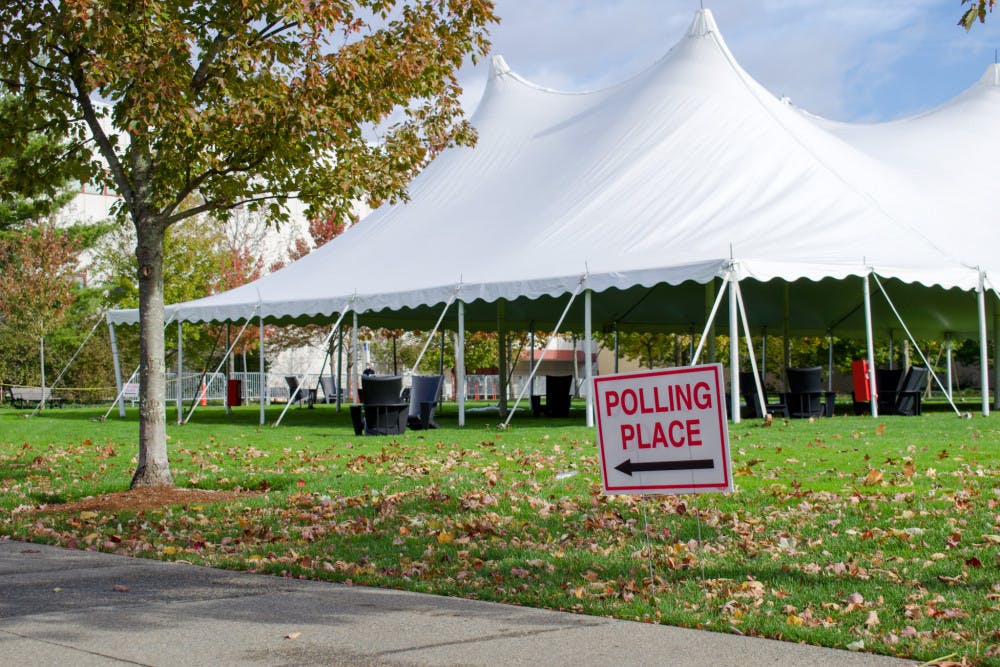With no victor declared in the presidential race on election night, members of the University community from across the political spectrum are anxious — and cautiously optimistic.
Early Wednesday morning, President Donald Trump had clinched key swing state Florida, while former Vice President Joe Biden had pulled ahead in Arizona.
“I am very anxious, a little (more) than I’m letting on,” said Jasmine Powell ’22, president of Brown College Democrats.
Powell spent Tuesday night focused on multiple screens — a television switching between cable news networks and a laptop with projections open. Powell, who is from Pennsylvania, voted by mail weeks ago, and it is not lost on her that her vote might not be counted for days.
Pennsylvania officials were not allowed to begin counting its nearly 2.6 million received mail-in ballots until Election Day, and the count might not be complete until Friday at the earliest. Pennsylvania’s 20 electoral votes are likely crucial to either candidate’s path to victory.
But Powell said that an uncertain outcome on election night was expected. Mail-in ballots are “changing the experience of election night,” she said.
Powell wasn’t caught off guard by Trump’s victory in Florida, where he outperformed some polls. “After 2016, we all take polls with a grain of salt,” she said.
“What’s reassuring me is that there are still multiple viable paths for (Biden),” Powell said. She is confident that Biden will take Rust Belt states like Wisconsin, Michigan and Pennsylvania — all of which were unknown on election night — and hopes that high turnout will help the Democrats.
For Zanagee Artis ’22, who is working for the Biden campaign in Philadelphia, interacting with voters made him confident that Biden will win. That doesn’t stop him from feeling anxious watching results roll in.
“The next four years will be very different depending on who wins,” Artis said late on election night. He spent most of the evening attending the watch party hosted by the Taubman Center for American Politics and Policy and refreshing news of results. He said he expected not to know who the next president would be on election night, but didn’t expect this much uncertainty.
“Everything is up in the air,” Artis said. “Everything is subject to change.”
Based on his experience campaigning in Philadelphia, Artis feels that increased voter engagement in Pennsylvania will drive a Biden win. He and his fellow organizers have registered at least 2,000 new voters in the city.
Nationwide, he believes that high voter turnout in big cities will benefit Democrats. He pointed to cities like Detroit and Phoenix — major cities in key swing states — as the impetus for an eventual Biden victory.
Republican students expressed similar anxiety with the uncertainty surrounding the outcome.
“I’m on the edge of my seat,” said Jessica McDonald ’21, president of the Brown College Republicans. McDonald felt nervous two weeks ago, expecting a Biden landslide, but the race has tightened since, she said.
McDonald said she is happy with the results so far, particularly Trump’s win in Florida. But, she said, the race is still a toss up.
“Florida is necessary but not sufficient for a Trump victory,” she said. McDonald said that Trump’s strong showing in Miami-Dade County shows that his appeal to a diverse group of voters was partially successful.
Ross Cheit, professor of political science and international and public affairs, wrote in an email to The Herald that a long wait for final results was expected if Biden didn’t win the Sun Belt. Now, he said, he’s more focused on how the Biden and Trump camps will react in the days ahead.
Cheit said he is worried about Trump’s rhetoric that undermines trust in the results of the election. He also expects legal challenges to certain results.
“It would have been better for the country to have a decisive result,” Cheit wrote.
For Powell, an uncertain result on election night is not ideal, but it’s preferable to a fraudulent outcome.
“It’s difficult on all of our mental health,” Powell said, “but I want to make sure every ballot is counted and that the winner is whoever won fair (and) square.”

Ben Glickman was the 132nd editor-in-chief and president of The Brown Daily Herald. He previously served as a metro editor and oversaw the College Hill and Fox Point beat, in addition to writing and editing about city politics, COVID-19 and the 2020 election. He is the co-creator of the Bruno Brief, The Herald's first news podcast. In his free time, he is passionate about birds (also tweeting) and eating way too spicy food.





